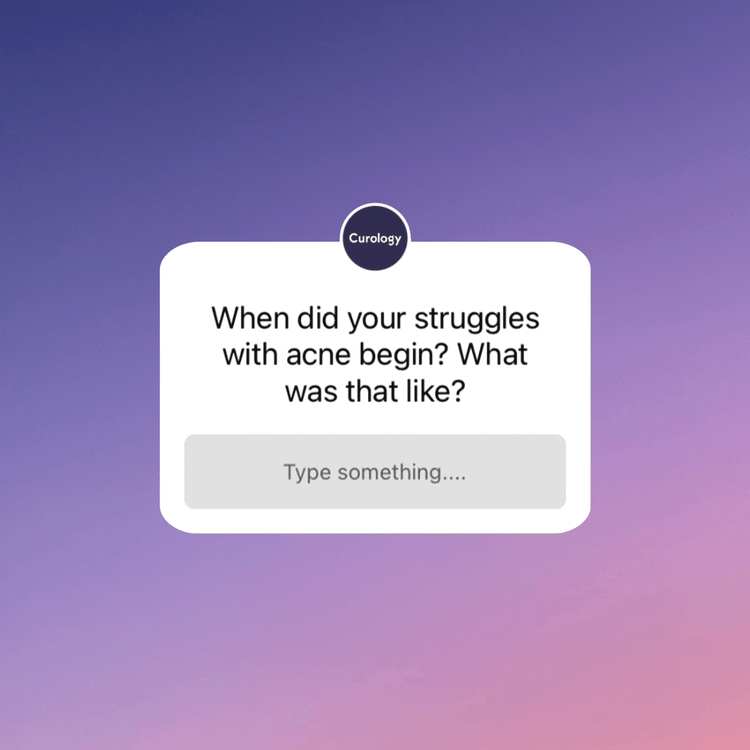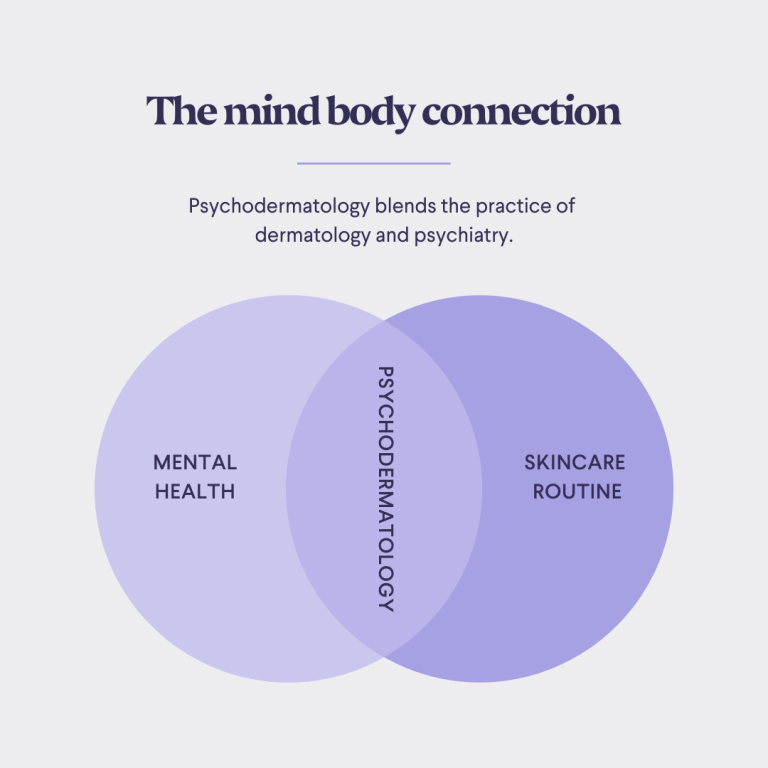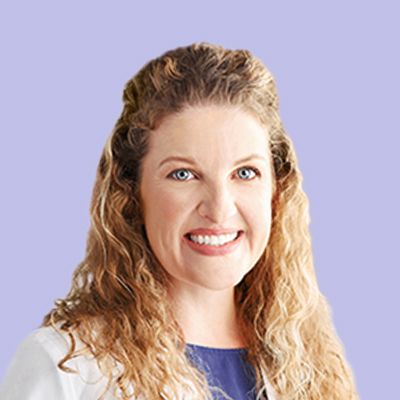How it works:
Share your skin goals and snap selfies
Your dermatology provider prescribes your formula
Apply nightly for happy, healthy skin
How it works:
How it works:
Share your skin goals and snap selfies
Your dermatology provider prescribes your formula
Apply nightly for happy, healthy skin
How it works:
The relationship between skincare and mental health
Anxiety about skin is real—here’s how you can tackle it and find support.



Disclaimer: This article is meant to be informative, not medical advice. Curology providers are here to support you on your skin journey, but they do not diagnose or treat mental health conditions.

Ah, acne. So, so common—but no less frustrating, as anyone with acne can tell you. But while we usually think of acne as a purely physical condition, the reality is that the emotional and mental repercussions (like stress or anxiety about skin) can be just as impactful.
Can depression and anxiety contribute to acne?
Although anxiety- and depression-related stress doesn’t directly cause acne, it may trigger a breakout—and create a vicious cycle: having acne can stress you out, stress may trigger acne, more acne can lead to even more stress, and so on.
According to a recent study published in the Journal of the American Academy of Dermatology, there’s a significant association between acne and depression and anxiety.¹ Conversely, treating acne can improve symptoms of anxiety and depression.²
Having acne can be challenging and may lead to:
Picking. Signs and symptoms of severe picking can include feelings of distress or social anxiety. In general, recurrent or repeated skin picking may cause skin lesions.
Anxiety.³ Signs and symptoms can include excessive worry, muscle tension, sleep disturbance, and a change in appetite.
Depression.⁴ Signs and symptoms can include feeling sad most days, losing interest in most activities, and sleeping too much or too little.
Poor self-esteem.⁵ Signs and symptoms can include negative beliefs about yourself and negative self-talk.
Social phobias.⁶ Signs and symptoms can include fear of humiliation, negative evaluation, and embarrassment in social situations.⁷
Body dysmorphia. Signs and symptoms can include social avoidance and being overly concerned with minimal or non-existent flaws.

How does skincare relate to mental health?
Not all acne is severe, but even mild acne can have a big impact on your life.
Sometimes skincare helps your mental health…
Skincare is a type of self-care—so going through your skincare routine every night can be a great way to unwind. It can boost your confidence, which in turn can increase your self-esteem and overall happiness. Establishing a routine can also help you maintain order and predictability in your life.
...and sometimes, it doesn’t.
It’s natural to have an emotional connection to your appearance, so it can affect your confidence and state of mind when you notice acne or other skin conditions. Not all people with acne experience mental health challenges, such as anxiety or depression, but it’s very real for those who do.
You’re not alone
There’s absolutely no shame in having anxiety about your skin or other mental health challenges. Acne affects at least 50 million Americans per year,⁸ and studies show⁹ that it affects up to 85% of people between the ages of 11 and 30 globally. People experience acne and its impacts differently, but there are methods to help cope or overcome it, and there are always people out there who can help.
If you’re suffering mentally or emotionally, reach out to someone! If you ever consider harming yourself, you can always talk to someone right away by texting CONNECT to 741741 or calling the National Suicide Prevention Lifeline at 988.
(These numbers are only available in the United States. If you’re in another country, search Google for similar resources available to you.)
What to do if you notice your skin is negatively affecting your mental health
Realize that your feelings are completely valid. Feeling upset that your skin isn’t where you want it to be isn’t “an overreaction” or “being dramatic.”
Take a break from social media. Comparing yourself to posts in your feed isn’t the way to go—especially since nowadays, many photos are touched up a little (or a lot).
Make some time for self-care. Relaxation practices—such as meditation, yoga, exercise, journaling, spending time with loved ones, and doing things you enjoy—serve as effective forms of self-care.
Reach out to someone you feel comfortable with and talk about how you feel. Anxiety and depression are extremely common. Chances are, talking with a trusted person and sharing your feelings will help. In fact, research suggests that simply putting feelings into words can help manage difficult emotions.¹⁰ Not sure who to talk to? Start with a trusted friend, family member, or healthcare provider. If you’d like to learn more, the National Association of Mental Illness (NAMI) is a great resource that discusses who to reach out to, when to reach out, and how to talk about your feelings. Another good resource is the Cypress Resilience Project.
Talk to a medical professional. These days there are more virtual options in healthcare, including therapy. You can also talk with your in-person provider to explore local resources.
Some resources if you need additional help
National Suicide Prevention Lifeline (available 24/7): 988
Substance Abuse and Mental Health Services Administration (available 24/7): 1-800-662-4357
Crisis Textline (available 24/7): 741741
Apps like Happify or Talkspace
(These numbers are only available in the United States. If you’re in another country, search Google for similar resources available to you.)
Psychodermatology, aka the relationship between mind and skin
Psychodermatology is an emerging field that blends the practices of dermatology (the branch of medicine dealing with skin) and psychiatry (the branch of medicine dealing with mental, emotional, and behavioral health). Focusing on the link between the mind and skin, it’s specifically concerned with the overlap between mental health and skin conditions—like the impact of stress and anxiety on the skin.

Acne and psychodermatology
As most people dealing with it can tell you, acne can have a significant psychological impact, so it often requires effective treatment to improve both the skin and self-esteem. Psychodermatology takes a two-part approach to help address mental health and skin concerns like acne as well as other chronic skin conditions like alopecia, eczema, rosacea, and psoriasis¹¹—particularly when stress makes symptoms worse.
What kind of treatment does a psychodermatologist provide?
Psychodermatologists and psychodermatology centers aim to provide psychological support (like therapy) alongside dermatological treatments.¹²,¹³ Your treatment plan might come with multiple steps and may include topical or oral skin medications you’d receive at a traditional dermatology practice and/or mental health treatments. For example, suppose you have symptoms of both acne and depression. In that case, a psychodermatologist may prescribe both a topical skin cream and an antidepressant.
Where can I find a psychodermatologist?
Psychodermatology is considered a specialized practice in the United States. Talk to your in-person provider to explore whether a psychodermatologist can help treat your acne and how to find one near you.
And even if a psychodermatologist isn’t available in your area, it’s helpful to express your concerns to your in-person provider! They can advise on other ways to seek treatment for both your skin and mental health.
How your Curology provider can help
Your Curology provider cares for your wellbeing and wants to help—so feel empowered to reach out to them! Your messages are a safe space to talk about what you’re experiencing.
However, if you’re considering or experiencing thoughts about self-harm, please contact the suicide hotline or notify the police or emergency medical services (911) immediately.
Mental Health First Aid (MHFA) helps a person experiencing a mental health challenge, mental disorder, or mental health crisis.
MHFA training is a course provided by a team of mental health professionals to train the providers to recognize the signs and symptoms that suggest a potential mental health challenge and how to refer someone to appropriate professional support and services.
If you’re not a Curology patient but would still like to talk to one of our providers, you can sign up here. Curology focuses on helping you achieve your skin goals with the help of a dermatology provider. The first 30 days are free—just pay $5.45 (plus tax) in shipping and handling.*
Get your personalized skincare routine with Curology
Get your personalized skincare routine with Curology


The first step can often be the hardest one to take, but please reach out for help if you need it! You’re too important not to take care of yourself.
PS. we did the research so you don't have to.
Samuels, D. V., et. al. Acne vulgaris and risk of depression and anxiety: A meta-analytic review. Journal of the American Academy of Dermatology. (2020)
Gieler, U., et. al. Acne and quality of life - impact and management. Journal of the European Academy of Dermatology and Venereology. (2015).
Locke AB, Kirst N, Shultz CG. Diagnosis and management of generalized anxiety disorder and panic disorder in adults. American Family Physician. (2015).
Park, L. T., & Zarate, C. A., Jr. Depression in the Primary Care Setting. The New England Journal of Medicine. (2019).
Fennell M.J.V. (2005) Low Self-Esteem. In: Freeman A., Felgoise S.H., Nezu C.M., Nezu A.M., Reinecke M.A. (eds) Encyclopedia of Cognitive Behavior Therapy. Springer, Boston, MA.
Rose, G. M., & Tadi, P. Social Anxiety Disorder. StatPearls. (2021).
Castle, D. J., et al. Body dysmorphic disorder and cosmetic dermatology: more than skin deep. Journal of cosmetic dermatology. (2004)
Skin conditions by the numbers. American Academy of Dermatology.
Gieler, U., et. al. Acne and quality of life - impact and management. Ibid.
Lieberman, M. D., et al. Putting feelings into words: affect labeling disrupts amygdala activity in response to affective stimuli. Psychological science. (2007).
Koo, J., & Lebwohl, A. Psycho dermatology: the mind and skin connection. American family physician. (2001).
Dartmouth - Hitchcock. Psychocutaneous Medicine.
Association for Psychoneurocutaneuous Medicine of North America. History of psychodermatology in the United States.
*Cancel anytime. Subject to consultation.

Curology Team

Kristy Simbulan, NP-BC
Related Articles
Ask an expert: What are the best skincare ingredients?Keep an eye out for these potential acne-causing ingredients What does irritated skin look like?How to create a self-care routine that actually sticksWhich tretinoin is right for you, according to Vogue?Popular Articles
Ask Curology: Is my cold breaking me out?Slugging: The dermatologist-approved skincare hack going viral on TikTokTretinoin vs retinol: What’s the difference?How to create a self-care routine that actually sticksYour 2023 skincare horoscopeTry prescription skincare
Get routine essentials


Good skin days ahead
Good skin days ahead
- Breakouts
- Redness
- Fine lines
- Dark spots
- Hair thinning
$29.95/month